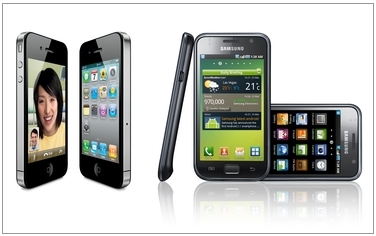
Lawyers for both Apple and Samsung have completed their closing statements in the intellectual property infringement case in attacking style, with Apple lawyers emphasising the "genius" of Steve Jobs and Apple, and Samsung lawyers accusing Apple of using allegations of infringement over trivial patents for anti-competitive purposes.
Apple lawyer Harold McElhinny said that when the first Apple iPhone had been released, Samsung had a stagnant line-up of mobile phones. "Steve Jobs shocked the world," said McElhinny.
In response, Samsung spent three-months rushing together the first Samsung Galaxy S phone, "mimicking" the style, features and functions of the iPhone in a bid to catch up. "No Samsung witness ever sat in that chair and said 'those designs are not similar'," argued McElhinny.
Apple deserved up to $2.75bn (£1.74bn) in compensation because Samsung had spent billions of dollars copying Apple. "They have spent a billion dollars mimicking our designs and holding it out to the world so the Apple design is no longer seen as unique," McElhinny said.
Samsung attorney Charles Verhoeven, though, suggested that Apple was driven by anti-competitive motivations – using its claims of uniqueness to close down competitive threats via the aggressive US system of intellectual property law.
Verhoeven argued that the evidence Apple had presented was not "credible". Apple, he said, believes that it is "entitled to have a monopoly on a rounded rectangle with a touchscreen".
Verhoeven dismissed Apple's arguments that Samsung copied the rectangular iPhone shape with rounded corners, suggesting that form was following function in the phone market in the same way that it has done in the market for televisions.
"Just think about walking into a Best Buy store. You go into the TV section. All of the TVs look the same. They're all boxes. They're all flat screens. They're all minimalist designs," said Verhoeven.
Attacking one of Apple's witnesses, the designer Susan Kare who claimed not to be able to see the difference between Apple and Samsung icons, he added: "Let's not pretend you can patent a colourful row of icons."
The jury needed to consider very carefully their decision, because the wrong verdict would have implications for the US's culture of business and free competition, he added.
In response
On Apple's side, William Lee provided a rebuttal to Verhoeven's arguments, claiming that Samsung had acted in bad faith and copied the work of other, more innovative companies. "They copied our product," he said, "but what they're saying to you is 'we don't want to pay'."
Referencing some of the evidence presented from internal Samsung products, he said: "If Samsung had all of this... why was there a crisis in design? ...It took Apple five years to create this revolution, and Samsung took three months to copy it. That's the truth, and that's simple, clear, and undisputed.
"You're going to have to decide who lived by the rules and who didn't live by the rules," he said. "And those who didn't live by the rules were Samsung."
The US patent system, he added, existed to protect innovative companies like Apple, and Samsung would continue copying other companies unless it was given a "slap on the wrist".
In the less than 15 minutes remaining to him, Samsung's Verhoeven pointed out Apple's alleged infringement of Samsung technology patents, before returning to his theme of competition.
"Let's have Samsung compete freely in the marketplace instead of Apple trying to stop it in the courtroom," he said.





